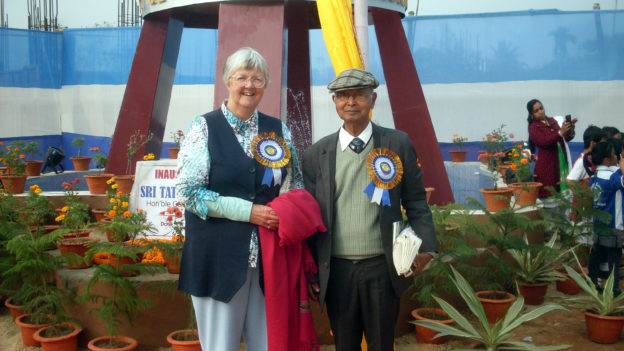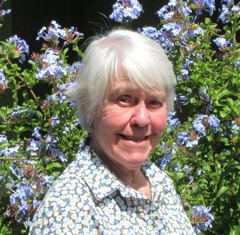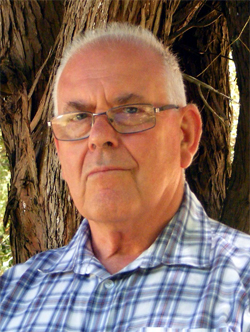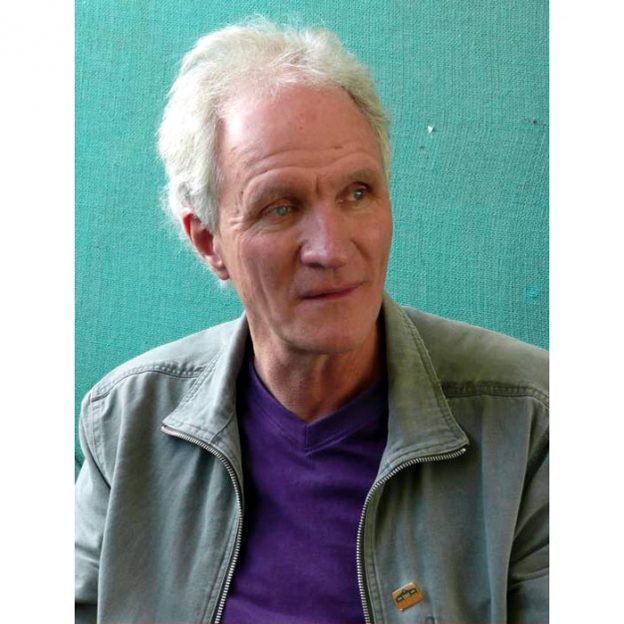 Chapter 5 — The Madcap Adventure Starts
Chapter 5 — The Madcap Adventure Starts
Jeanie’s lunchtime investigation of how they might arrange their voyage to New Zealand had resulted in forms to fill in and an interview with the New Zealand Government’s “agent.” This man travelled around Scotland visiting pubs and other community gathering places to try to encourage people to go to the colonies. So, over the next few weeks, William and Jeanie met with him, then started to make arrangements to go to London to board the ship that would take them to New Zealand.
One thing that made them wonder, then laugh out loud, was William’s occupation. William was a miner, and was happy to be a miner in New Zealand, but, the agent told them, “there is no employment for miners in New Zealand. If you want to guarantee to be accepted on the immigration plan, put yourself down as a Farm Labourer. There is a desperate shortage of farm labourers in New Zealand. As you will be paying most of your fare yourself, you can change jobs when you get there, and do anything you want to.”
Eliza was a little worried about this, “How do we know that is not a trap to get you out there so that you can be taken off to some slavery type of job?”
The men all laughed at this, William pointing out that he had been in a “slavery type of job” for all his working life, and actually enjoyed the work and the people he worked with. The only thing he didn’t enjoy was having to have a bath each night before he was able to sit down on his own chair. Maybe farm labourers didn’t get so filthy that they had to wash every day before they could relax in their own home.
That seemed to settle the argument. As James gently pointed out to Eliza, she had trapped herself when she started to talk about slavery in the mines and such things. It was obvious that she was manufacturing arguments that even she did not believe in.
So time and preparation went on. The agent told them that, if they paid their own fare, they had more choices than if they took up the New Zealand government’s offer to pay it for them. At £29, it would take up all their savings, but they felt it would be worth it for the independence it gave them. If they accepted the Government’s fare offer, they would be told where to work, and what to work at, and may not get a land grant.
“Ownership of land is,” the agent said, “the main reason most people go to any of the colonies. The land here is so tied up that there is little hope of anyone outside of the landed families or businessmen being able to buy any. But if you pay your own way out to New Zealand, I can guarantee that you will receive a grant of at least twenty acres.”
Twenty acres seemed to William and Jeanie to be a major reason to emigrate, regardless of all the other reasons they had, which they admitted were mainly emotional.
So they signed up, collected their savings together, found that they would still have something left after paying their £29, and decided that everything was working for them. They were surprised to find that, when they totted up the money they received from selling their furniture, plus a little that both parents were delighted to be able to give them, they were still quite well off. But they did not tell anybody that they had a purse of money. If nothing else, there was the fear of robbery on the journey out.
So on the 11th of August 1875, William and Jeanie boarded a coach in Stevenston, which would take them in a few hours to Glasgow, where they were to catch a train to London. In many ways, Jeanie thought, this could be the scariest part of the whole journey, they had to find their way around Glasgow to catch the train, then get off it in London and make their way to the wharves, and find their ship and so on. Once they were on board the ship all that was needed was to hold on tight so that you did not get thrown overboard. That was how Jeanie envisaged the journey, but stopped worrying after they had been on the road for just a few minutes.
William had no more experience of travel in Scotland and England than Jeanie had, but he seemed to be confident. He told Jeanie some of the stories that he had heard from his mother about her and her husband’s trip from Ireland to Scotland, and how she and James had worked day by day to earn food and lodging, and how good people had been to them.
“There are always good people around,” he told Jeanie confidently, “and if we ever get into distress I am sure that they will help us as they did my mother and father.”
Jeanie was not quite so confident, but asked James to tell her some of the stories so that she could better understand the trials and the triumphs they could expect on this journey. He was happy to do this, partly to divert both their minds from the understandable apprehensions, and partly because he was genuinely proud of the things his parents had done to get to where they now were.
The need for help from good people soon became apparent.
The coach driver was surly, to say the least. He didn’t like loading their luggage on his coach, and then expected William to unload it in Glasgow. By the time they had got their bags down when the coach stopped at the Glasgow Railway Station, they could hear what they thought might have been their train hooting at the platform. Rushing in to the ticket office, they asked for two third class tickets to London, to be asked when they were travelling.
“Now,” said William. “We are going to London to board a ship to take us to New Zealand.”
“Not today you’re not,” the ticket seller told them. “Train to London’s just gone, next one’s in the morning, unless you want to take the milk train, which leaves at 7.00 pm and takes about double the time, stops at every little stop along the way.”
“I don’t think so,” William said, “although we do need somewhere to sleep. Maybe sleeping on the slow train will provide that necessity. If I buy our tickets now, will they be good on tomorrow’s train?”
“Yes, they are good for any train to London. Morning one leaves at 8.00 am sharp, and takes a little under 10 hours. You had better be on it or that will be the end of your trip to New Zealand.”
William paid for the tickets, and they moved back from the ticket office. A long queue had formed during their discussion with the ticket seller, making them embarrassed by some of the muttering going on in the queue.
“What now?”
Neither said it, but both thought it, and were wondering where to turn for help, and to find lodging for the night, or whether they should take the slow train which the ticket seller had been at pains to tell them to avoid. Suddenly a man and lady who had been a few people behind them in the ticket queue came to them, apologised for listening to their conversation with the ticket seller, and asked what they were going to do now that they had missed their train.
“I think we need lodging for the night,” William said, “but this town is not known to us, so we don’t know where to start looking.”
“We heard you say about going to New Zealand,” the man said, “Our son and his wife and children went there just a few months ago, we’re not even sure that they have arrived there yet but they should have done. But you could have their room in our house for the night if you would like it.”
Jeanie looked at the lady with gratitude in her eyes. Her look made it obvious that they were delighted to accept the offer.
“Where were you buying tickets to?” Jeanie asked, to be told, “we go to see our daughter and her family in Stevenston most Sunday afternoons, and always like to get the coach tickets early. Did you know that you can buy coach tickets at the railway station? Having the tickets means that we can get straight on the coach without the need to queue, or to hurry.”
Obviously, the next question was, “Who is your daughter?”
This led to introductions. Their new friends were Mr and Mrs McTavish and their daughter was Ailsa. She was known slightly to Jeanie through her occasional visits to the milliner’s, but her husband worked in the Post Office in Stevenston and as neither Jeanie nor William had much call to go there, they did not know him. Jeanie and William introduced themselves, and picked up their bags ready to walk back to their benefactors’ home. Mr McTavish insisted on carrying Jeanie’s bag, which William had picked up along with his own.
The McTavish house was barely five minutes’ walk away. To judge from the scrubbed exterior, especially the front step, it was likely to be the cleanest and tidiest place they had ever seen. They were not to be disappointed.
Mrs McTavish said, as she noticed them looking around, “One thing about living here rather than in Stevenston is that it is easy to keep a house clean. We don’t have that coal dust and factory smoke that hangs around there all the time. Does that have anything to do with why you are leaving?”
So Jeanie and William told them about little Jane and all the trouble she had had with her breathing and how they had decided after that to get right away and start a whole new life.
“I think you are right,” Mr McTavish said. “We have often talked about emigrating, but never got beyond talking about it. It is really something for young people, and I think that you are doing very much the right thing.”
While they were talking, Mrs McTavish was bustling around the kitchen, and after a time Jeanie realised that good manners required that she should offer to help, not just sit there like a lady. So she went out to the kitchen, to be told, “No, I don’t need any help, but I would love to talk to you about what you are planning to do. It must be really exciting.”
So the women talked in the kitchen about their hopes and aspirations, while the men sat in the sitting room and discussed the problems of employment and unemployment. Mr McTavish, it transpired, had recently retired as a bank clerk. “But I was never given the opportunity to be any more than a clerk. I don’t know if it was me, or my work, or my manager, but I was never given any of the opportunities which became available to other people who worked there, especially the younger ones. It was a good life, but I don’t think the managers treated some of their staff fairly.”
William was not sure that working conditions in clerical jobs were as bad as those in the mines and factories he had worked in. He was, however, able to tell Mr McTavish a little about his father’s days as a trade unionist, trying to improve the conditions of work and the safety practices and suchlike in the mines. Mr McTavish sighed. “I wish I had had the courage to do something like that,” he said. “I suppose that it was that lack of courage, and perhaps initiative, that held me back. A bit more assertiveness on my part might well have made people think that I had what it takes to tackle more important jobs. But I have managed to save a bit, and buy this house, so I can’t really complain.”
“But you do complain,” said his wife, coming through the door with a bowl of steaming hotpot. “All the time.”
“Yes,” replied her husband, “but not when your cooking is around. I would not risk missing out on that for all the money in the world.”
William, sniffing the rich aroma from the pot on the table, could fully understand what he meant. They all sat down, Mr McTavish gave thanks to God for the meal, and they all ate their fill of the savoury meat dish. After the table had been cleared and the ladies had cleaned up in the kitchen, Mr McTavish asked William if he would like to go for a stroll. “I like to go out about this time each evening,” he said, “and it can get quite lonely walking by yourself, so I would be delighted to have company.”
William glanced at Jeanie, who said, “Off you go. We have important women’s talk to get on with. I have found out a whole lot of things about marriage that I wish I had been told years ago. I need to make sure that I learn all there is to learn on this important subject, and I can’t do it while there is a house full of men.”
After about an hour’s walk along the streets of Glasgow, the two men returned, to find the women still sitting talking, obviously very comfortable with each other’s company, as were the men, who had talked less, but nonetheless enjoyed their time together.
After hot drinks, everyone moved off to bed. When they were settling down in their room, Jeanie said to William, “Your parents were right. When you get into trouble or have a difficulty someone will come along and help you out. For all that we were treated roughly by the coachman, we have had a wonderful day with some wonderful outcomes.”
They did not sleep well that night, in spite of the comfortable bed, because each in their own way was dwelling on the idea of, “Where to next? What is likely to be our next problem, and will there be someone on hand to solve it for us?” Both admitted, when it started to become daylight, that they had been worrying their way through the night rather than sleeping.
When they heard Mr and Mrs McTavish moving around the house, they decided that it was time to get up. Then a call came at the door, “You have an hour to get organised and to the railway station, young people.”
“I’ve never had anything to do with armies,” William remarked, “but I understand that you get woken by a sergeant major at some horrible hour, with words that are far less kindly than that.”
“Just you wait,” Jeanie responded, “shipboard life may well be like an army, regimented and told where to go and when, and where you can’t go on pain of death.”
By the time they had worked their way through this disturbing thought they were up and dressed and coming down to breakfast. As they came into the room to be greeted by the smell and steam of porridge, William thought to offer his host some payment for the hospitality they had received. They were told in no uncertain terms to put their money away.
“We respect, indeed admire you for your courage,” Mrs McTavish said, “and we are delighted to be able to do just a little to help you out. What we want now is for you to be well fed and on that train in good time. So sit you down and break your fast before you go.”
After breakfast Jeanie and William quickly repacked, and started to say their goodbyes. Mr and Mrs McTavish said, “Not yet. You don’t think we are going to let you go on our doorstep. We want to see you safely on that train.”
So they went back to the station in much the same way they had arrived, with Mr McTavish carrying Jeanie’s bag, and William carrying his own. The two women were chattering away like old friends, which by now they were. In a way William and Jeanie wanted to get on to the train and get going, in another way they had found a new world here in Glasgow and were desperately clinging on to it as a wonderful new experience, the first, they hoped, of many. But it had to come to an end for their new adventure to start.
So, at the entrance to the platform, where the train was already sitting with its engine pouring out clouds of black smelly smoke, Mr and Mrs McTavish said their goodbyes, the women hugging each other and the men shaking hands. As they walked on to the platform and started to look for seats, Jeanie said to William, “If this is an omen of what our move to New Zealand is going to be like, I think we are going to do well.”
All William could do was agree as they turned and waved to their benefactors for the last time. Now all they wanted was for the train to get going, so that they could leave Scotland behind forever.
“Not,” William remarked, “that Scotland has been bad to us, apart from what happened to our little Jane, but we now have the whole world in front of us, and we must get on and make the most of this opportunity.”
At last the train moved, and as it got up steam the young couple realised that they were travelling faster than they had ever done before. They marvelled at the speed the landscape passed by, and how the animals in the paddocks scarcely looked up.
“I suppose they must be used to all this noise and smoke coming past every hour or so,” William remarked, while Jeanie was fascinated by the changing landscape, the different types of trees, and the wild flowers growing on the floor of the forests they passed through.
“I suppose that we need to get used to these changes,” she said. “On our journey out we will be passing all sorts of different countries, many of them deserts, and when we get to New Zealand it will no doubt be different again. I have never quite understood whether we will see tropical palm trees in New Zealand, or forests as we know them here.”
“I don’t quite know either,” William replied, “but one thing I think you are wrong about, my dear, is the different countries you say we will see as we travel. I think that we will be too far out at sea to observe very much, except on a few occasions when we come into a port to obtain provisions and water.”
This was a new idea to Jeanie, being at sea, out of sight of land for days, even weeks, on end. It was more frightening than anything else she had considered on this trip. She knew that when you went to the outer islands from Scotland, you could always see land, and if anything went wrong, it was not far to swim to safety. She had, of course, never been to the outer islands, and could not swim, but there was an illusion of safety which made the prospect seem less fearsome. She managed to restrain her thoughts about all of this so that she would not worry William. She sat silently considering the new ideas that were piling in on her, and they were yet only a few miles from home, and still on land at that!
The train journey was also full of excitement, with each of them pointing out things of interest to the other, especially during the stops at stations along the line. It seemed that in no time at all they were stopping at London’s Euston Station, the end of one journey and the beginning of another. It was also the source of an old yet new problem – where to stay the night? They had deliberately come down two days early, but had lost one of those days when they missed their train at Glasgow, so they now needed only one night’s accommodation, and had limited time to see the sights, which they had hoped to be able to do.
A friend in Stevenston who had been to London had told them of a lodging house near Euston Station, called Mrs Kelly’s Parlour. Mrs Kelly, he said, was a motherly Irish lady who would make them very welcome, and make sure that they got to the wharves in good time to board the ship. They saw a uniformed man in the vast cavern which was the ticket hall at the station, and asked if he could direct them. He gave them clear directions. “Go down the steps, turn right for a bit, then left at Station Street, and it is just along there. You can’t miss it. And the best of luck to you.”
They were both so excited that they didn’t notice the “best of luck” comment, nor the strange look he gave them. Much later they realised why he gave them both the look and the comment. But he was right about one thing, it was easy to find.
They arrived in with their bags, and introduced themselves to the lady at the reception desk, asking for a room for the night. They also asked if the lady, whom they assumed to be Mrs Kelly, could direct them to the wharves in the morning, so they could find the Ocean Mail, the ship on which the immigration agent had told them they were booked to Auckland, New Zealand. The lady smiled and said that she could accommodate them no problem at all. They agreed on a price, then she showed them upstairs to a back room, not quite as clean as the one they had stayed in the previous night, but quite sufficient for their needs.
“We’ll get you to the Ocean Mail in the morning,” Mrs Kelly said, “never you fear. There are several ways of doing that.”
After placing their bags in the room, they went out again, to see as much of London as they could in the few hours they had left before dark. The first thing they did was go back to Euston Station, surely one of the wonders of the world. They had not really been able to take it in previously, being so intent on finding their way to their lodgings. With the need for accommodation behind them, they were able to stand and wonder at the size of the building and its design.
“I have heard much about this station,” William commented, “it was built to serve a small amount of rail traffic, but has been added to time and time again, more lines and more buildings to cope with more trains and many more people. You can see the different building styles and the way some of the corridors are looking like the roads in a coal mine, built individually, with no overall plan in mind.”
After marvelling over the station, they went back on to the street, to explore what they could of the city before dark. As is always the case when you are visiting strange towns with no specific objective, they just walked around the area, not going too far from places they could identify, admiring the architecture, and wondering about the number of people who seemed to be just aimlessly walking the streets. Several times they were stopped by men who offered them special bargains at local shops, or could find them a home if they wanted to buy or rent one. They also met a man who said that, for £10 he could set William up for life as a hansom cab driver.
“One thing we have learned from this afternoon,” said William as they wandered around, “is that this city is full of rogues who are happy to take your money, and probably run away with it. New Zealand may well be the same. We need to be very careful.”
As it started to get dark, they went in to the railway tea rooms and purchased dinner, a wholesome, if somewhat bulky, meal for eight pence each. Highway robbery, they agreed, compared to prices in their home town. But, as William remarked, “We have never eaten out at home, so the five penny meals at Saltcoats may be of a much poorer standard.”
Anyway, they were well fed, and commented that, since Mrs Kelly did not provide breakfast, they had probably had enough food to see them through tomorrow until the first meal was served on the ship. As they entered their lodging house, a young couple came in before them, the girl seeming somewhat overpainted to Jeanie, but, she thought, perhaps that was the current fashion in London. William and Jeanie followed them up the stairs, after noting in a vague sort of way that Mrs Kelly had taken the couple’s money before they went upstairs, and had said to the girl as they left her counter, “Don’t spend too long up there, or I will come and get you like I did last time.”
Interesting goings on, thought Jeanie and William, but still didn’t fully register what those goings on were. As the night wore on, however, they had difficulty sleeping because of the number of people coming and going, making a lot of noise in the process with lots of talk and doors slamming. Towards morning things seemed to quieten a little, but when it became time to rise and set out for the wharves, neither of them were very rested. They reflected that the journey so far had not provided them with a lot of sleep. They hoped, but doubted, that they would do better at sea tonight.
They went downstairs to find another lady at the desk, who, when they asked, said, “Mrs Kelly has gone to bed. I generally take over here early in the morning so that she can get some sleep before the day starts.”
“Mrs Kelly told us that she would direct us to our ship, the Ocean Mail,” said William. “Are you able to do that?”
“Of course,” the lady replied. “We know all the sailors here, I am sure I can get you an escort to your ship, just wait here a while.”
As they waited, several men came down, some looking like seamen and one gentleman in an evening dress, and went out to the street. Then a man who looked very like their idea of a seaman came down and the lady at the desk called to him, “Paddy Murphy, are you not on the Ocean Mail?”
“Yes,” came the Irish accent back. “Why do you ask about what you already know?”
“These young folk are looking for directions to her. Can you take them with you?”
“Of course,” was the reply. “Give us yer bags and we’ll be off. We sail on the midday tide, so we only have about four hours. And I should be back at work.”
William was tempted to reply along the lines of, “we know when it is sailing,” but decided that there was no point in alienating a man who was helping them, and carrying their bags as well, so he remained silent.
Their new friend, Paddy, had one question for them, too. “How come you young folk were staying at Kelly’s? It’s not the kind of place I would take my young lady, or worse, my wife.”
As he said that, Jeanie gasped. “I knew there was something about it,” she said, “but I didn’t realise what sort of place it was. It was recommended to us by a friend back in Scotland.”
“Just as well we’re not going back to Scotland,” William remarked. “I would tell him what I thought of his recommendation. I can assure you that if I had known I would definitely not have taken my wife there.”
Jeanie started to giggle. “It will make a great story to tell,” she said, “but we can’t actually tell it to anyone. I think it would give my mother a heart attack, and for all that your parents have a wider experience of life than mine, I don’t know that they would really approve either.”
“Well,” said William, “we came for adventure and we are certainly finding it, even though we have not yet left England. Is that our ship over there?”
This last was a call directed to Paddy, who was walking much faster than they, more particularly Jeanie, could, and was therefore some distance in front of them.
“No,” he replied, stopping for a moment and turning around to them. “That’s the docks alright, but we still need to travel right along them. We’re berthed nearly at the other end. Why, hullo Tommy, were you at Kelly’s last night?”
This to another sailor who had overtaken William and Jeanie and caught up with Paddy.
“I was,” he replied. “And are you in the business of finding our passengers and bringing them on board? This is not a normal seaman’s job, or is the world changing more than we thought it was?”
So Paddy explained, with a little bit of mirth, and a lot of ribaldry, how he had come to meet up with William and Jeanie, and by the time the story had been fully told they had walked some distance along the wharf. Both William and Jeanie were finding it difficult to step over the ropes, and dodge the horses and carts, and the people with barrows and all the other activity which keeps the ships coming and going. Although it looked chaotic, they supposed that someone knew what was going on, who was doing what needed to be done, and that it would be complete and in order by the time the ship sailed.
So, at 9.00 am on the 23rd of November 1875, William and Jeanie were standing on the wharf at London looking apprehensively at a ship with its name, Ocean Mail, painted on the bow, or what they thought of as the front. Apart from the name, they knew very little about the Ocean Mail, but thought, and briefly discussed, that she seemed very small to take several hundred people like them, and their possessions, half way around the world.
As they looked at her three masts, they thought about their two sailor friends who had to climb those very fragile looking poles in, probably, the very worst of weather.
“I thought ships were built of wood,” Jeanie said to William, “But that doesn’t look like wood to me. It looks as if it is built using the same sort of materials that are now being used for big water tanks.”
A voice behind them said, “Iron is the modern material for ships, it has lots of good qualities. And you have it right, lassie, she is built like a water tank, the difference is that this tank has to keep water out, not in like the ones you were referring to. But she is a fine, modern vessel. If a wave hits it will not break a timber, but will resist, and is much less prone to spring a leak during a storm.”
The man speaking was obviously another seaman, their escorts Paddy and Tommy having disappeared the moment they saw that William and Jeanie could, from here, look after themselves. This man was doing whatever it is seamen do with the ropes holding the ship alongside the wharf. William was not certain if his, “much less prone,” remark was designed to frighten them or stem their apprehensions.
“Have you done a voyage in this ship?” William asked.
“I have, several,” replied the man they were already regarding as a friend, holding out his hand to William. “Thomas Carpenter, leading hand, and I am pleased to meet you. Yes, I have been to Australia and to New York on board this fine ship. Never to New Zealand, though, so this will be a new port for me as well.”
William, shaking the offered hand, introduced himself and his wife, and said, “I can see that this ship is bigger than many others around. Does that mean it will carry more people, or will we have more room? And will it rock around less on the waves of the ocean? Is all the crew as experienced as you? What is that?”
The last question was directed at a very large vessel going down the harbour, the largest and strangest looking ship that William and Jeanie had ever seen. It had, apart from a quite different hull shape, three huge funnels, each belching clouds of smoke like a railway engine, but no sign of a sail anywhere, although she did have three masts which looked if they could have borne sails.
As the questions poured out, William realised how little he really knew about ships and the sea, apart from the dire warnings he had had from some friends and neighbours as they were planning this journey. He was also aware that Jeanie knew even less, so hoped that their new friend would continue to give positive answers to their questions. He did not seem to be the kind of man who would deliberately frighten them as a poor sort of joke.
“That is one of them new steam ships, just a much bigger ship than the little steam ferries and work boats you see around here. They are using the same principles as the engines that trains have had for many years.” Thomas replied, “You will watch the sailors up the rigging on this ship, and fear for their safety in a storm. But below decks on that ship over there are men whose life is shovelling coal into massive boilers, which have to be fed regardless of how the ship is tossing around. The only real advantage of those ships is that they are not dependant on the wind. This means that the captain can tell the owners to within a day or two when the ship will arrive in the next port and when they will get back. We, on our sailing ships, cannot give an accurate assessment to within several weeks. But you good folk had better get on board, and find your accommodation before we sail.”
William thought about how his father had described the work of stokers on the ferry which had brought him and Eliza from Belfast to Glasgow. He almost heard the words echoing as James had described a job that, even though he was a professional coal handler, he wanted no part of.
It was only much later that William and Jeanie realised that Thomas had only answered one of their questions, the very last one. They never really did find out whether the Ocean Mail was better than other ships, or had more room on board, as they never had the opportunity to compare. What they did know as the voyage proceeded was that it was crowded, did toss around in the water, especially when they encountered storms, and had a lot of people on board.
As they carried their bags up the gangway they were met by a ship’s officer, whose tone was a little brusque.
“Name?” he said, and when they told him, he said, “Down that ladder, turn forrad at the bottom, and you will find two bunks marked 116 and 117. They are yours, and keep yourselves and your possessions within the confines of those bunks. Next!”
Click to Order eBooks or Print books
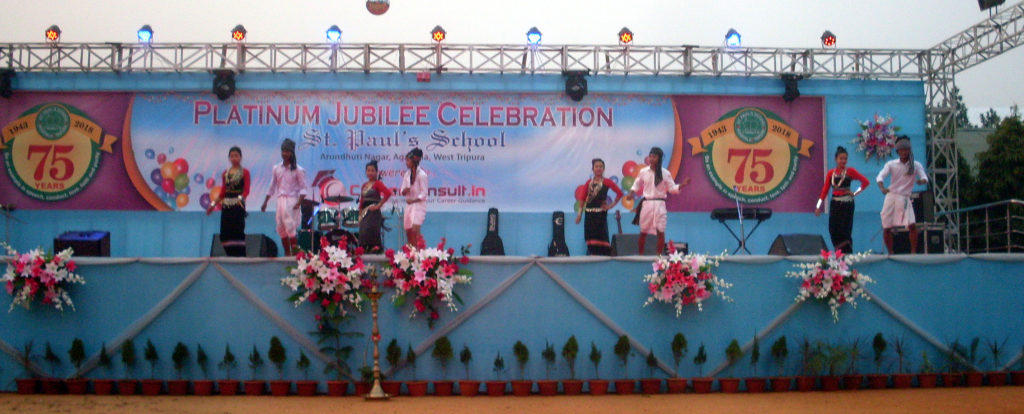 Dancers perform at 75th celebrations
Dancers perform at 75th celebrations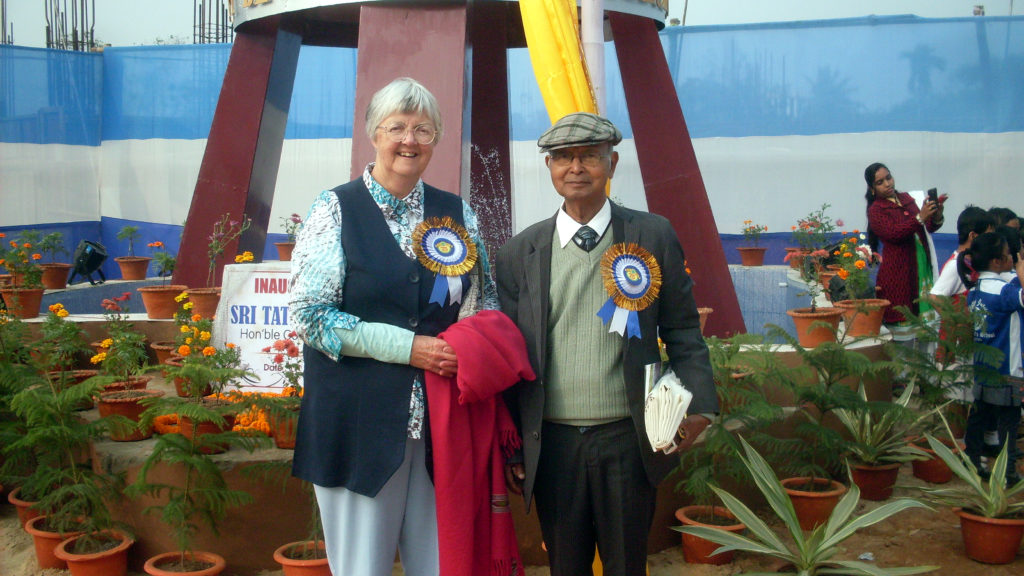 Pat with Lalbulliana Rokhum, first Indian principal of St Paul’s School
Pat with Lalbulliana Rokhum, first Indian principal of St Paul’s School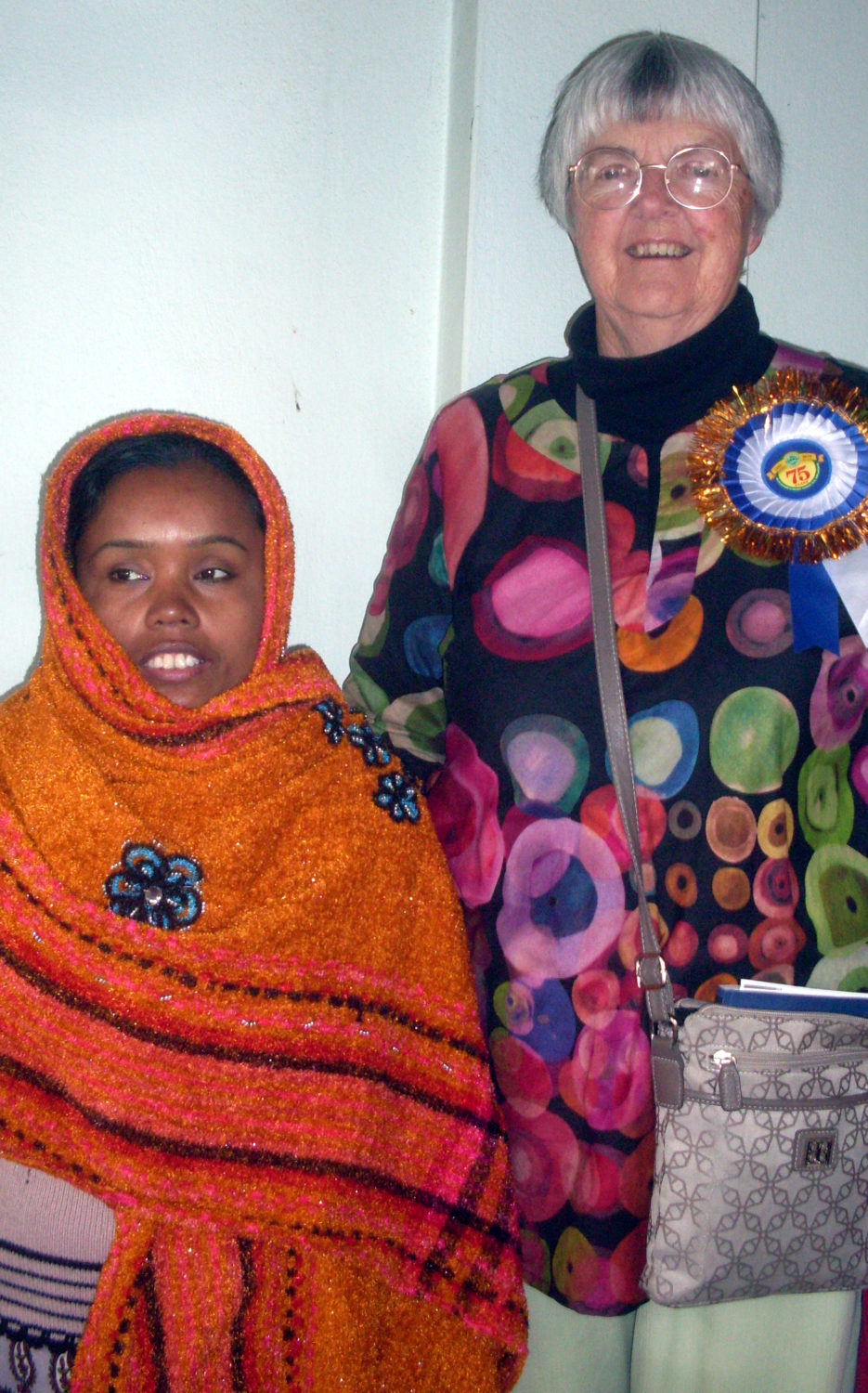 Pat & Konica (a former St Paul’s primary school pupil) at the Kiwi House on the Tripura Baptist Christian Union site at AD Nagar.
Pat & Konica (a former St Paul’s primary school pupil) at the Kiwi House on the Tripura Baptist Christian Union site at AD Nagar.
